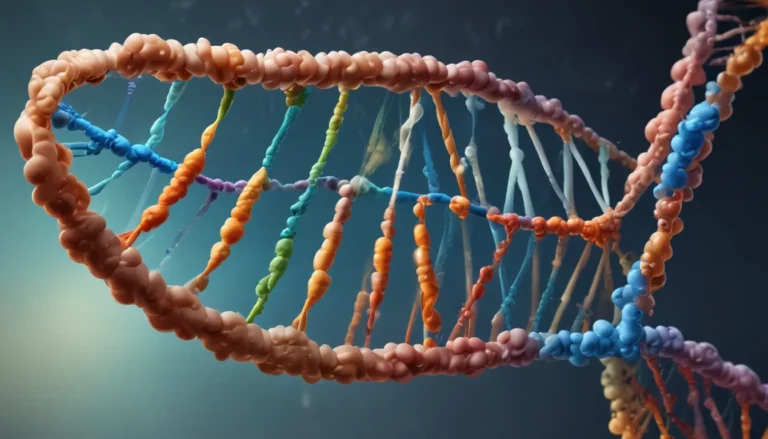A Note About Images: The images used in our articles are for illustration purposes only and may not exactly match the content. They are meant to engage readers, but the text should be relied upon for accurate information.
In the vast realm of biology lies a captivating branch known as molecular taxonomy, where the intricate dance of genetics and classification converge to illuminate the diversity of life on Earth. By harnessing the power of DNA and molecular biology, scientists delve into the evolutionary relationships among organisms, reshaping our understanding of the natural world. Join us on a journey to uncover 14 fascinating facts about molecular taxonomy, revealing the complex tapestry of life that surrounds us.
Key Takeaways:
- Unlocking Genetic Mysteries: Molecular taxonomy leverages DNA to classify organisms and unveil new species, aiding in evolution studies and conservation endeavors.
- Versatile Applications: From forensic science to agriculture and medicine, molecular taxonomy serves as a genetic superhero, unraveling mysteries and enhancing various fields.
Molecular Taxonomy: A Closer Look
At the core of biology, molecular taxonomy emerges as a vital discipline that sifts through the genetic blueprints of organisms to classify and understand their intricate relationships. By utilizing molecular tools like DNA sequencing, scientists can unravel the genetic mysteries that underpin the diversity of life.
Revolutionizing Classification Systems
Unlike traditional methods, molecular taxonomy offers a more precise way to classify organisms by analyzing their DNA sequences. This approach allows scientists to delve into the evolutionary kinship between species, unraveling genetic similarities and differences along the way.
PCR: A Game-Changer in Molecular Taxonomy
The advent of the polymerase chain reaction (PCR) technique in the 1980s heralded a new era for molecular taxonomy. PCR enables researchers to amplify specific DNA segments, facilitating efficient analysis and comparison of genetic information.
Discovering the Unseen: New Species Unveiled
Through molecular techniques, scientists have unearthed previously unknown species, spotlighting genetic variances among populations and discerning distinct species boundaries. These discoveries illuminate the hidden gems of biodiversity.
Evolutionary Insights: Tracing Genetic Lineages
Molecular taxonomy serves as a beacon of light in deciphering the evolutionary web that connects organisms. By scrutinizing DNA sequences, scientists can unveil common ancestors and trace the evolutionary history encoded in the genetic fabric of different species.
From Lab to Courtroom: Molecular Taxonomy in Forensic Science
The tools of molecular taxonomy, such as DNA profiling, have found extensive applications in forensic science. By harnessing DNA analysis, investigators can identify individuals and unravel familial relationships, paving the way for breakthroughs in criminal investigations.
Guardians of Biodiversity: Conservation Efforts Enhanced
In the realm of conservation biology, molecular taxonomy plays a pivotal role in safeguarding precious biodiversity. By studying the genetic diversity and relationships within populations, scientists can craft effective conservation strategies to protect endangered species.
Unveiling Disease Signatures: Molecular Insights in Medicine
By delving into the genetic makeup of pathogens, molecular taxonomy aids in disease identification and diagnosis. This knowledge forms the bedrock for targeted treatments, vaccine development, and a deeper understanding of disease mechanisms.
Cultivating Life: Agricultural Applications of Molecular Taxonomy
The agricultural sector reaps the benefits of molecular taxonomy through enhanced crop and livestock genetic insights. By deciphering the genetic makeup of agricultural commodities, scientists pave the way for improved varieties and sustainable agricultural practices.
Microcosms Under the Lens: Exploring Microbial Communities
Molecular taxonomy serves as a gateway to explore the intricate world of microbial communities and their interactions. Through the analysis of microbial DNA, scientists unveil the diversity and functions of microorganisms, vital players in ecosystem dynamics.
A Landscape of Innovation: Constant Evolution in Molecular Taxonomy
Driven by technological advancements and innovative molecular techniques, molecular taxonomy stands as a rapidly evolving field. Scientists continuously push the boundaries to refine species classification and untangle the intricate genetic relationships that shape the living world.
Healing Horizons: Medical Implications of Molecular Taxonomy
In the realm of medicine, molecular taxonomy holds profound implications. By scrutinizing genetic variations among individuals, scientists gain insights into disease mechanisms, tailor personalized treatments, and pinpoint genetic markers for specific conditions.
Guardians of Ecosystems: Identifying Invasive Species
Molecular techniques serve as a beacon in tracing the origins of invasive species and aiding in their identification and management. Understanding the genetic makeup of intruders is instrumental in crafting effective control measures to protect native biodiversity.
The Interdisciplinary Tapestry: Molecular Taxonomy’s Diverse Terrain
Molecular taxonomy weaves together insights from biological, genetic, bioinformatics, and data analysis realms, embodying an interdisciplinary landscape. Navigating laboratory techniques and computational analyses, scientists chart the genetic landscapes of life.
Conclusion: A Tapestry of Life Unveiled
In conclusion, molecular taxonomy stands as a gateway to exploring the intricate tapestry of life on Earth at a molecular level. By scrutinizing DNA and biomolecules, scientists unearth profound insights into the evolutionary relationships among species, transforming our understanding of biodiversity. With each advancement in technology, molecular taxonomy unveils new frontiers in species classification and genetic revelations, reshaping our perception of the natural world.
FAQs:
- What is molecular taxonomy?
-
Molecular taxonomy is a branch of biology that employs molecular techniques like DNA sequencing to classify and unravel the evolutionary relationships among organisms.
-
How does molecular taxonomy differ from traditional taxonomy?
-
Molecular taxonomy focuses on analyzing the genetic makeup of organisms, offering a more precise and objective method of classification compared to traditional taxonomy based on morphological features.
-
What are the advantages of molecular taxonomy?
-
Molecular taxonomy allows for accurate species classification, providing insights into genetic similarities, hidden relationships, and evolutionary patterns that morphological features may overlook.
-
How is molecular taxonomy used in conservation?
-
Molecular taxonomy aids in identifying biodiversity hotspots, preserving genetic diversity, and detecting endangered species, playing a crucial role in conservation efforts.
-
Can molecular taxonomy be applied to humans?
-
Yes, molecular taxonomy finds applications in forensics, population genetics, and the study of human evolution and migration patterns, contributing valuable insights in human-related fields.
-
Are there any limitations to molecular taxonomy?
-
Factors like incomplete genetic data, horizontal gene transfer, and convergent evolution pose challenges in the accurate classification of organisms through molecular taxonomy.
-
Are there any emerging trends in molecular taxonomy?
- Emerging trends in molecular taxonomy include next-generation sequencing techniques, metagenomics, and the integration of molecular and morphological data to construct more comprehensive evolutionary trees.
Embark on a journey through the realms of molecular taxonomy to unravel the genetic mysteries that underpin the rich tapestry of life on Earth. Explore the intersections where genetics and classification converge, illuminating the remarkable complexity and diversity that characterize our natural world. Join us in celebrating the wonders of molecular taxonomy, a captivating field that continues to shape our understanding of biodiversity and unlock the secrets of life’s intricate genetic fabric.





